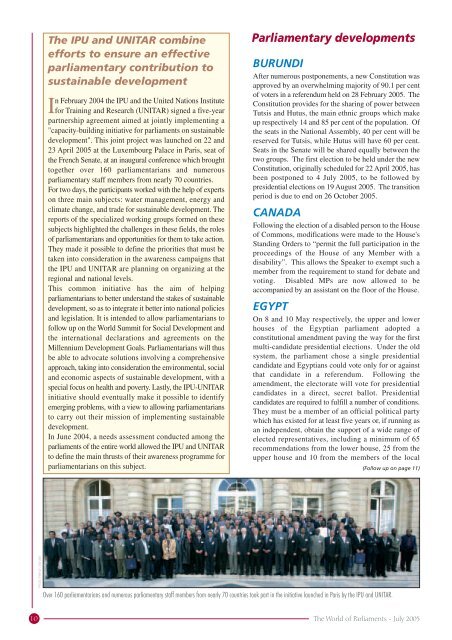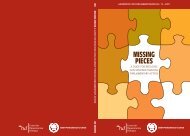PDF 631 Kb - Inter-Parliamentary Union
PDF 631 Kb - Inter-Parliamentary Union
PDF 631 Kb - Inter-Parliamentary Union
You also want an ePaper? Increase the reach of your titles
YUMPU automatically turns print PDFs into web optimized ePapers that Google loves.
The IPU and UNITAR combine<br />
efforts to ensure an effective<br />
parliamentary contribution to<br />
sustainable development<br />
In February 2004 the IPU and the United Nations Institute<br />
for Training and Research (UNITAR) signed a five-year<br />
partnership agreement aimed at jointly implementing a<br />
"capacity-building initiative for parliaments on sustainable<br />
development". This joint project was launched on 22 and<br />
23 April 2005 at the Luxembourg Palace in Paris, seat of<br />
the French Senate, at an inaugural conference which brought<br />
together over 160 parliamentarians and numerous<br />
parliamentary staff members from nearly 70 countries.<br />
For two days, the participants worked with the help of experts<br />
on three main subjects: water management, energy and<br />
climate change, and trade for sustainable development. The<br />
reports of the specialized working groups formed on these<br />
subjects highlighted the challenges in these fields, the roles<br />
of parliamentarians and opportunities for them to take action.<br />
They made it possible to define the priorities that must be<br />
taken into consideration in the awareness campaigns that<br />
the IPU and UNITAR are planning on organizing at the<br />
regional and national levels.<br />
This common initiative has the aim of helping<br />
parliamentarians to better understand the stakes of sustainable<br />
development, so as to integrate it better into national policies<br />
and legislation. It is intended to allow parliamentarians to<br />
follow up on the World Summit for Social Development and<br />
the international declarations and agreements on the<br />
Millennium Development Goals. Parliamentarians will thus<br />
be able to advocate solutions involving a comprehensive<br />
approach, taking into consideration the environmental, social<br />
and economic aspects of sustainable development, with a<br />
special focus on health and poverty. Lastly, the IPU-UNITAR<br />
initiative should eventually make it possible to identify<br />
emerging problems, with a view to allowing parliamentarians<br />
to carry out their mission of implementing sustainable<br />
development.<br />
In June 2004, a needs assessment conducted among the<br />
parliaments of the entire world allowed the IPU and UNITAR<br />
to define the main thrusts of their awareness programme for<br />
parliamentarians on this subject.<br />
<strong>Parliamentary</strong> developments<br />
BURUNDI<br />
After numerous postponements, a new Constitution was<br />
approved by an overwhelming majority of 90.1 per cent<br />
of voters in a referendum held on 28 February 2005. The<br />
Constitution provides for the sharing of power between<br />
Tutsis and Hutus, the main ethnic groups which make<br />
up respectively 14 and 85 per cent of the population. Of<br />
the seats in the National Assembly, 40 per cent will be<br />
reserved for Tutsis, while Hutus will have 60 per cent.<br />
Seats in the Senate will be shared equally between the<br />
two groups. The first election to be held under the new<br />
Constitution, originally scheduled for 22 April 2005, has<br />
been postponed to 4 July 2005, to be followed by<br />
presidential elections on 19 August 2005. The transition<br />
period is due to end on 26 October 2005.<br />
CANADA<br />
Following the election of a disabled person to the House<br />
of Commons, modifications were made to the House's<br />
Standing Orders to “permit the full participation in the<br />
proceedings of the House of any Member with a<br />
disability”. This allows the Speaker to exempt such a<br />
member from the requirement to stand for debate and<br />
voting. Disabled MPs are now allowed to be<br />
accompanied by an assistant on the floor of the House.<br />
EGYPT<br />
On 8 and 10 May respectively, the upper and lower<br />
houses of the Egyptian parliament adopted a<br />
constitutional amendment paving the way for the first<br />
multi-candidate presidential elections. Under the old<br />
system, the parliament chose a single presidential<br />
candidate and Egyptians could vote only for or against<br />
that candidate in a referendum. Following the<br />
amendment, the electorate will vote for presidential<br />
candidates in a direct, secret ballot. Presidential<br />
candidates are required to fulfill a number of conditions.<br />
They must be a member of an official political party<br />
which has existed for at least five years or, if running as<br />
an independent, obtain the support of a wide range of<br />
elected representatives, including a minimum of 65<br />
recommendations from the lower house, 25 from the<br />
upper house and 10 from the members of the local<br />
(Follow up on page 11)<br />
Photo French Senate<br />
Over 160 parliamentarians and numerous parliamentary staff members from nearly 70 countries took part in the initiative launched in Paris by the IPU and UNITAR.<br />
10 The World of Parliaments - July 2005
















